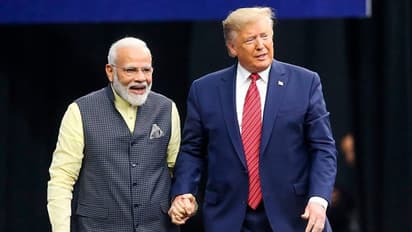US Elections 2024: How Donald Trump's presidency could navigate Indian market? Key points

Synopsis
Donald Trump's victory in the US Elections 2024 could offer India benefits in trade, energy, and defense, with increased opportunities in sectors like manufacturing. However, his protectionist policies, stricter immigration rules, and a stronger US dollar could negatively impact Indian exports.
Republican candidate Donald Trump defeated Democratic candidate Kamala Harris in the US presidential election, according to the latest vote counts. Indian equity markets have shown a positive reaction to Trump’s potential victory. However, what could Trump’s return to the White House mean for India’s stock markets in the long term?
An analysis by ET suggests that India could potentially gain from this situation, with a favorable outlook for Foreign Portfolio Investment positioning and an anticipated increase in capital flows, as per the brokerage firm’s assessment.
How will Trump's victory benefit India?
If Trump wins, Indian export sectors may see substantial benefits, as higher tariffs on Chinese goods could make Indian manufacturers more competitive in the US, particularly in industries such as auto parts, solar equipment, and chemical production.
Additionally, Trump’s fossil fuel policies, combined with an expected slowdown in China’s economic growth, could lead to lower energy costs, benefiting Indian oil companies like HPCL, BPCL, IOC, and gas distribution firms such as IGL and MGL.
The manufacturing and defense sectors could also experience growth, as Trump’s focus on bolstering US industry may positively affect companies operating in both India and the US, including ABB, Siemens, Cummins, Honeywell, GE T&D, and Hitachi Energy.
Reduced international tensions under Trump’s leadership could streamline supply chains, providing advantages to Indian businesses. Moreover, his emphasis on strengthening US manufacturing and military capabilities could create new opportunities for Indian defense companies, including Bharat Dynamics and HAL.
Trump’s pro-business stance, with potential reductions in corporate taxes, regulatory requirements, and business-friendly policies, could further improve the investment climate, potentially boosting Indian equity markets.
Potential Disadvantages for India due to Trump's Return:
A Trump presidency might lead to inflation, which could impact Indian businesses through higher interest rates and increased costs for materials and equipment sourced from the US. Economic analysts predict that his proposed policies on tariffs, deportation, and deficit spending could create inflationary pressures, leading to immediate rises in prices and adjustments in wages.
Trump's economic policies could boost the US dollar and drive up bond yields due to tax cuts and fiscal measures. This could attract global capital to the US, which may weaken emerging market currencies, including the Indian rupee. A stronger dollar would raise India's import costs, especially for oil, contributing to higher domestic inflation.
Although initial market gains may occur, Trump's policy uncertainties could lead to prolonged market instability. Historical data reveals that during his first term, US markets outperformed Indian markets, with Nasdaq rising by 77%, while Nifty gained only 38%.
Under Trump, previous restrictions on H-1B visas impacted Indian IT companies, leading to higher rejection rates and increased costs. However, these companies have adapted by boosting local US hiring and increasing their number of green card holders, which has helped reduce their vulnerability to future immigration restrictions.
Trump has criticized India's trade policies and proposed reciprocal tariffs. His administration may pressure India to lower trade barriers, potentially impacting sectors such as IT, pharmaceuticals, and textiles. However, his push to reduce dependence on Chinese manufacturing could create opportunities for India to benefit in these areas.
Check the Breaking News Today and Latest News from across India and around the world. Stay updated with the latest World News and global developments from politics to economy and current affairs. Get in-depth coverage of China News, Europe News, Pakistan News, and South Asia News, along with top headlines from the UK and US. Follow expert analysis, international trends, and breaking updates from around the globe. Download the Asianet News Official App from the Android Play Store and iPhone App Store for accurate and timely news updates anytime, anywhere.